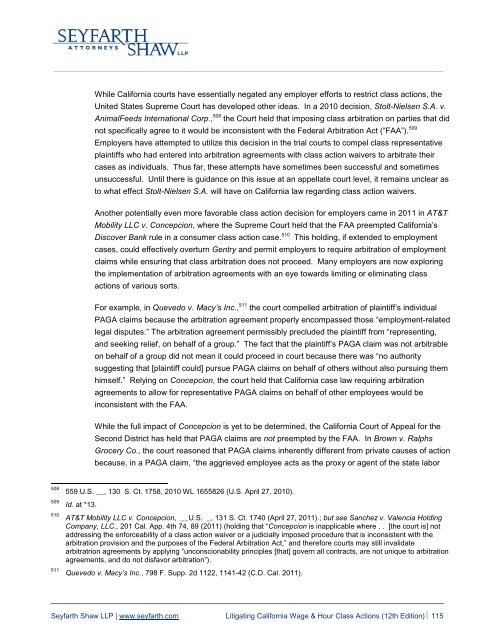Litigating California Wage & Hour and Labor Code Class Actions
Litigating California Wage & Hour and Labor Code Class Actions
Litigating California Wage & Hour and Labor Code Class Actions
Create successful ePaper yourself
Turn your PDF publications into a flip-book with our unique Google optimized e-Paper software.
While <strong>California</strong> courts have essentially negated any employer efforts to restrict class actions, the<br />
United States Supreme Court has developed other ideas. In a 2010 decision, Stolt-Nielsen S.A. v.<br />
AnimalFeeds International Corp., 508 the Court held that imposing class arbitration on parties that did<br />
not specifically agree to it would be inconsistent with the Federal Arbitration Act (“FAA”). 509<br />
Employers have attempted to utilize this decision in the trial courts to compel class representative<br />
plaintiffs who had entered into arbitration agreements with class action waivers to arbitrate their<br />
cases as individuals. Thus far, these attempts have sometimes been successful <strong>and</strong> sometimes<br />
unsuccessful. Until there is guidance on this issue at an appellate court level, it remains unclear as<br />
to what effect Stolt-Nielsen S.A. will have on <strong>California</strong> law regarding class action waivers.<br />
Another potentially even more favorable class action decision for employers came in 2011 in AT&T<br />
Mobility LLC v. Concepcion, where the Supreme Court held that the FAA preempted <strong>California</strong>’s<br />
Discover Bank rule in a consumer class action case. 510 This holding, if extended to employment<br />
cases, could effectively overturn Gentry <strong>and</strong> permit employers to require arbitration of employment<br />
claims while ensuring that class arbitration does not proceed. Many employers are now exploring<br />
the implementation of arbitration agreements with an eye towards limiting or eliminating class<br />
actions of various sorts.<br />
For example, in Quevedo v. Macy’s Inc., 511 the court compelled arbitration of plaintiff’s individual<br />
PAGA claims because the arbitration agreement properly encompassed those “employment-related<br />
legal disputes.” The arbitration agreement permissibly precluded the plaintiff from “representing,<br />
<strong>and</strong> seeking relief, on behalf of a group.” The fact that the plaintiff’s PAGA claim was not arbitrable<br />
on behalf of a group did not mean it could proceed in court because there was “no authority<br />
suggesting that [plaintiff could] pursue PAGA claims on behalf of others without also pursuing them<br />
himself.” Relying on Concepcion, the court held that <strong>California</strong> case law requiring arbitration<br />
agreements to allow for representative PAGA claims on behalf of other employees would be<br />
inconsistent with the FAA.<br />
While the full impact of Concepcion is yet to be determined, the <strong>California</strong> Court of Appeal for the<br />
Second District has held that PAGA claims are not preempted by the FAA. In Brown v. Ralphs<br />
Grocery Co., the court reasoned that PAGA claims inherently different from private causes of action<br />
because, in a PAGA claim, “the aggrieved employee acts as the proxy or agent of the state labor<br />
508<br />
509<br />
510<br />
511<br />
559 U.S. __, 130 S. Ct. 1758, 2010 WL 1655826 (U.S. April 27, 2010).<br />
Id. at *13.<br />
AT&T Mobility LLC v. Concepcion, __U.S. _, 131 S. Ct. 1740 (April 27, 2011).; but see Sanchez v. Valencia Holding<br />
Company, LLC., 201 Cal. App. 4th 74, 89 (2011) (holding that “Concepcion is inapplicable where . . [the court is] not<br />
addressing the enforceability of a class action waiver or a judicially imposed procedure that is inconsistent with the<br />
arbitration provision <strong>and</strong> the purposes of the Federal Arbitration Act,” <strong>and</strong> therefore courts may still invalidate<br />
arbitratrion agreements by applying “unconscionability principles [that] govern all contracts, are not unique to arbitration<br />
agreements, <strong>and</strong> do not disfavor arbitration”).<br />
Quevedo v. Macy’s Inc., 798 F. Supp. 2d 1122, 1141-42 (C.D. Cal. 2011).<br />
Seyfarth Shaw LLP | www.seyfarth.com <strong>Litigating</strong> <strong>California</strong> <strong>Wage</strong> & <strong>Hour</strong> <strong>Class</strong> <strong>Actions</strong> (12th Edition) 115
















